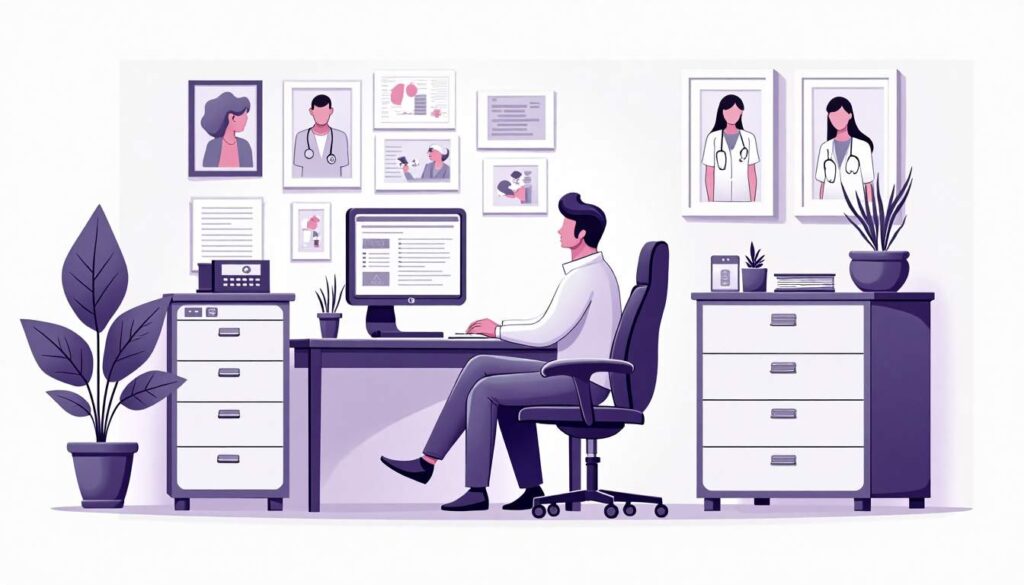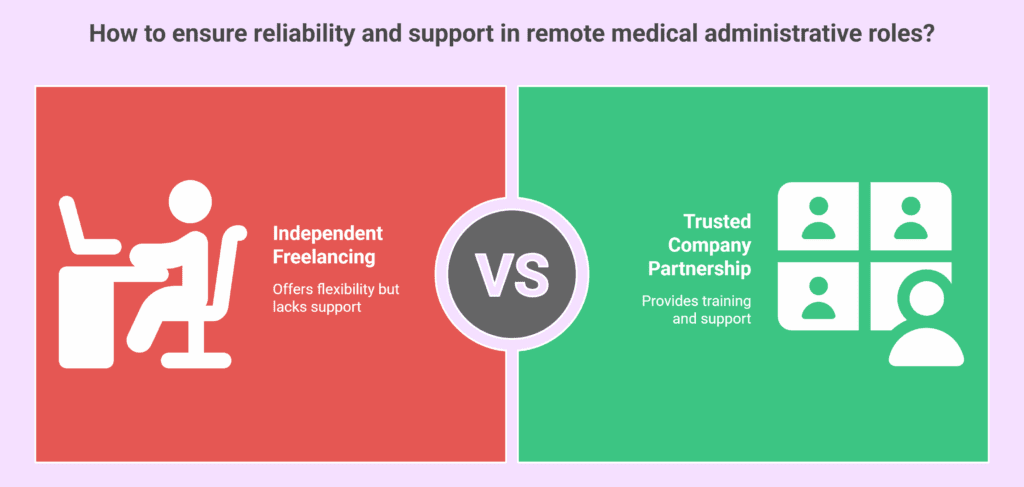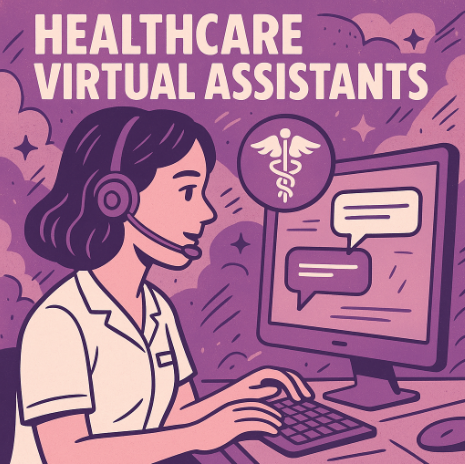How to Become a Medical Administrative Assistant Online: A Step-by-Step Guide
10 Jul 2025 By: Maria Rush
Updated
Learning how to become a medical administrative assistant remotely is an awesome way to enter the healthcare industry, without even leaving your home. This job is perfect if you’re organized, tech-savvy, and enjoy helping people. Let’s talk about exactly how to become a medical administrative assistant, step-by-step, with a focus on remote opportunities.

What Does a Remote Medical Administrative Assistant Do?
As a remote medical administrative assistant, your daily tasks are similar to those of someone working in a physical office. But you handle everything virtually. Some typical duties include:
- Setting appointments and organizing digital calendars
- Handling patient records securely
- Processing insurance paperwork and billing online
- Communicating clearly with patients and medical staff through email, phone calls, or video chats
- Managing daily workflows with digital tools
You’re often the first person patients interact with, being friendly and organized is essential. Being comfortable with technology is also super important.
How to Become a Medical Administrative Assistant Online
Step 1: Setting Up Your Workspace
You don’t need formal diplomas or degrees to get started remotely. However, it’s helpful if you:
- Have basic tech skills. This includes Zoom, Google Workspace, Microsoft Office, etc.
- Set up a quiet workspace with reliable internet. A good computer, and a headset also goes a long way.
- Have a high school diploma or GED. Although it’s not always necessary.
Step 2: Build Your Skills Online
Formal college isn’t required for remote medical administrative assistants. Instead, you can quickly and affordably get essential training online:
- Learn medical terminology basics (try platforms like Alison or Udemy)
- Understand Electronic Health Record (EHR) systems.
- Take introductory courses in medical billing, claims, and coding.
There are plenty of online courses designed specifically for remote medical administrative assistants. These online courses can help you gain the right skills quickly and affordably.
Step 3: Get Real-World Experience
If you’re trying to land your first remote job as a medical administrative assistant, getting some hands-on experience really helps. Doesn’t have to be anything fancy.
- You could start by volunteering or doing a short virtual internship with a telehealth clinic or remote admin service. It gives you a peek into how things actually work day-to-day. Way more useful than just reading about it.
- Try picking up a few freelance gigs on sites like Upwork or OnlineJobs.ph. They don’t have to be long-term. Just doing real tasks for real clients builds your confidence (and your resume). Plus, you’ll probably learn a ton just by doing.
- Shadow someone already in the role, or have a quick chat to learn what the job’s really like.
Basically, nothing beats real experience. It shows employers you’re serious. It also gives you a much better sense of what the job actually feels like.
Step 4: Consider Helpful Certifications
Certifications aren’t required. But it can boost your resume:
- Certified Medical Administrative Assistant (CMAA)
- Certified Professional Coder (CPC)
- Google Workspace Certification (demonstrates proficiency in using Google tools)
- Google IT Support Professional Certificate (builds foundational tech support skills)
Certifications show employers you’re committed and knowledgeable.
Step 5: Find Your First Remote Job
Now it’s time for the job hunt! Keep things simple by:
- Highlighting remote-friendly skills. Such as digital scheduling, knowledge of EHR software, and online communication.
- Browsing job sites like Indeed, LinkedIn, Glassdoor, OnlineJobs.ph, and specialized sites like Virtual Vocations
- Joining online communities or social media groups that are about remote healthcare work.
Step 6: Nail the Remote Interview
Remote interviews are similar to traditional ones. But keep these tips in mind:
- Practice answers related to working remotely, patient communication, and managing sensitive information
- Check your tech setup beforehand to avoid surprises.
- Dress professionally and ensure your background is tidy and distraction-free.
Step 7: Keep Growing Your Career
Getting hired is just the start. It is best to continue developing your skills by:
- Attending webinars or short courses regularly.
- Aiming for roles like remote medical billing or claims specialist. As well as virtual office manager.
- Staying updated on new technologies and healthcare industry trends.
Why It Matters Who You Work With

Who you work with really matters. Whether you’re hiring or looking to get hired as a remote medical administrative assistant. Not every listing or platform out there is reliable, and going it alone can be risky.
That’s why working with a trusted company like HelpSquad makes a difference. They don’t just pair people up and walk away. They handle the hiring, training, and ongoing support. It means less stress, more consistency, and better results on both sides.
For providers, you get someone dependable and trained to handle sensitive tasks. And for those starting out, you’re not just freelancing in the dark, you’re part of a team that’s got your back.
TRENDING NOW
Healthcare virtual assistants are catching on fast. The market is set to grow from $1.4 billion in 2025 to over $19 billion by 2035. A big reason? More clinics are using tools like voice tech and chat to handle tasks like scheduling and patient follow-ups. These assistants are also helping with chronic care and mental health support. As telemedicine grows and more people use wearables and health apps, demand keeps rising. Companies like Microsoft, Amazon, and Nuance are investing big. Still, issues like data privacy and complicated healthcare rules need to be sorted out.
Conclusion

“A career is a series of ups and downs, of comebacks.”
– Steve Guttenberg
So now you’ve got a clear path to becoming a remote medical administrative assistant. It’s a flexible, meaningful career. If you stick with it, you’ll get there. One step at a time.
And if you’re on the other side (running a busy practice and feeling buried in admin tasks) HelpSquad can help. Our trained remote medical administrative assistants can jump in and handle the day-to-day stuff. Talk to us so your team can focus on what really matters: your patients.
FAQ’s
What are the medical administrative assistant certification requirements?
The medical administrative assistant certification requirements typically include completing an accredited training program, passing a recognized certification exam, and demonstrating basic healthcare office competencies. Depending on your state or employer, additional medical administrative assistant certification requirements may involve background checks or proof of clinical terminology training. Always check the certification body’s website for the most updated medical administrative assistant certification requirements.
Can medical administrative assistants work from home?
Yes, can medical administrative assistants work from home is a common question, and many roles today allow remote scheduling, billing, or telehealth support. Whether can medical administrative assistants work from home depends on the employer, tasks, and security requirements related to patient data. With the rise of telemedicine, the answer to can medical administrative assistants work from home is increasingly “yes,” especially for organizations that support remote administrative functions.
What are remote healthcare administrative assistants and what do they do?
Remote healthcare administrative assistants perform tasks such as scheduling, insurance verification, billing coordination, and patient communication—entirely online. Employers rely on remote healthcare administrative assistants to handle high-volume administrative workloads while maintaining HIPAA compliance. As telehealth expands, remote healthcare administrative assistants are becoming a critical part of healthcare operations.
How to hire medical executive assistant professionals for clinics or telehealth practices?
Understanding how to hire medical executive assistant talent begins with defining the role, needed skills, and compliance requirements. When determining how to hire medical executive assistant candidates, look for experience in healthcare operations, strong communication skills, and familiarity with EHR systems. Employers who understand how to hire medical executive assistant staff effectively often conduct skills tests, verify certifications, and assess confidentiality practices.
Do remote healthcare administrative assistants require special training?
Most remote healthcare administrative assistants need the same training as in-office professionals, but with added emphasis on telecommunication software and data privacy. Because remote healthcare administrative assistants manage sensitive information from outside the clinic, they should be trained on secure remote workflows. Many employers prefer remote healthcare administrative assistants who already have certification and remote work experience.
Do medical administrative assistant certification requirements differ by state?
Yes, some states specify additional medical administrative assistant certification requirements, especially for roles involving billing or handling patient records. National programs set baseline medical administrative assistant certification requirements, but employers may add expectations based on their internal standards. Always verify local and industry-specific medical administrative assistant certification requirements before applying.
What skills should I look for when learning how to hire medical executive assistant staff?
If you’re exploring how to hire medical executive assistant professionals, prioritize candidates with strong organizational abilities, experience with medical terminology, and expertise in EHR platforms. Part of knowing how to hire medical executive assistant candidates is evaluating their discretion and professionalism. Organizations that master how to hire medical executive assistant roles often use behavioral interviews and scenario-based assessments.
If can medical administrative assistants work from home, what technology do they need?
For organizations asking can medical administrative assistants work from home, the required technology usually includes a secure computer, HIPAA-compliant communication tools, and stable internet. Whether the answer to can medical administrative assistants work from home is yes depends on the ability to maintain patient confidentiality remotely. Employers that confirm can medical administrative assistants work from home successfully often implement remote access protocols and data security training.
Are there career opportunities for remote healthcare administrative assistants?
Yes, demand for remote healthcare administrative assistants continues to grow as clinics adopt digital workflows. Hospitals, private practices, and telehealth companies all employ remote healthcare administrative assistants for administrative and patient-facing tasks. Many career ladders also allow remote healthcare administrative assistants to transition into billing, management, or operational leadership roles.v


